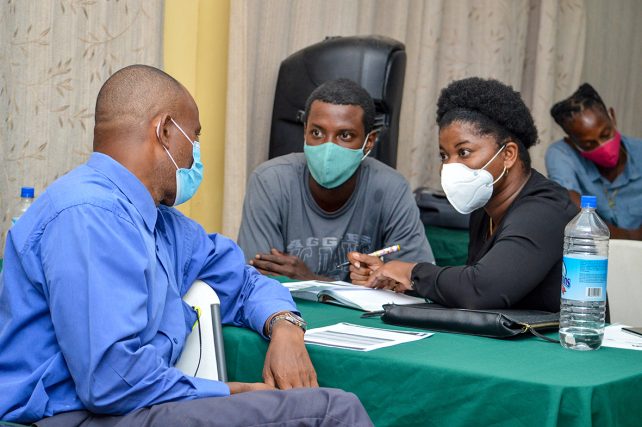
In partnership with the Government of Dominica, UNDP is implementing the “Strengthening the Disaster Management Capacity of Women in the Cooperative Republic of Guyana and The Commonwealth of Dominica” (GUY/DOM) project with funding from the Government of Japan. This 3-year project aims to enhance the capacity of farmers, emphasising female farmers, in preparing and managing disasters, and improve their ability to contribute to national efforts for preparing and managing disasters within the agriculture sector. In Dominica, participant farmers are drawn from the three parishes of St. David, St. Paul and St. Patrick.
Today, in collaboration with the Division of Agriculture, the project launched a 2-hour introductory gender
awareness workshop at the Public Service Union Building. Officers were encouraged to draw from their field
experiences to explore the differences between sex and gender and how this understanding influenced their work
with female and male farmers. The purpose is to improve the knowledge, attitudes and skills of officers in order to
create gender-responsive programming, reduce bias and improve gender awareness.
In Dominica agriculture employs up to 40% of the labour force, and it is estimated that males comprise 85% of skilled
agricultural and fishery workers, compared to 15% of females. Studies suggest that men’s and women’s unequal
participation in agriculture is linked to gender-based access to land, credit, extension services and other productive
assets, and gendered occupational segregation and differential wages. Men generally own larger parcels of land and
are involved in larger-scale agricultural production for export, and the rearing of large livestock. While women
generally have access to smaller plots of land, are more involved in household food production, small scale
vegetable production and the rearing of small livestock. The limited access to financing also undermines rural
farmers, and in particular, women farmers and agricultural workers, from being able to expand into new markets
and move beyond the bounds of the “working poor”, as such many of them have to engage in a range of other
livelihood activities for support.
Therefore, while this project works with, and benefits both female and male farmers, it employs a gender-inclusive
approach, that is, works to ensure women’s needs are met and not marginalised. For this approach to be realised
the project focuses on the gender awareness of participants, partners and stakeholders alike. At the workshop,
Sawana Fabien Project Co-ordinator highlighted the importance of this noting “to change the discourse on gender
it is critical that all persons involved in supporting the mainstreaming are aware of the nuances that surround the
topic. It definitely is not the exclusion of men however gender shapes each farmer’s experience in agriculture; with
respect to affordability, access and use of services and products, and interaction with extension services. It is
therefore incumbent that service providers are cognizant of the issues and agenda to begin effectively addressing
the inequalities which make women more vulnerable during times of disaster”
Gender sensitivity training is only one of many interventions this project will implement. Other interventions include
the Participatory Integrated Climate Services for Agriculture (PICSA) training to help farmers better utilize climate
specific information to make informed decisions; the provision of two vehicles to support the work of the agriculture
extension officers, development of a micro-finance facility, crop insurance, procurement of tools for, and training in
the use of early warning systems and the provision of grants to farmers.

Lets fact check this for a second__________
1: explore the differences between sex and gender: There is no difference, this Idea that there are 32+ genders as opposed to 2 sexes male and female is a movement that started with the homosexual community in America and picked up by the liberals there it does nothing but confuse the youth and bring discord amongst citizens of our God-fearing land.
2: In Dominica agriculture employs up to 40% of the labor force, and it is estimated that males comprise 85% of skilled agricultural and fishery workers, compared to 15% of females. This is true but we know he reasons behind it, Dominican women gravitate towards office jobs instead of fields that consist of manual skilled labor, the idea of agriculture sums up images of toiling under the hot Caribbean sun is not appealing towards the general female population here on the island. it is the ugly truth.
This “initiative” statement is steeped in academia. It does not get down to the root problem of agriculture in Dominica. The problem is not gender related but government neglect.
A young lady that cashes me out at a Roseau supermarket has a degree in agriculture. She would rather be working on the land, but as things stand, she earns more working part-time at checkout.
Wait, I’m a little, well maybe a lot confused. “Introductory gender
awareness workshop”? Sorry, but that is a waste of time and money. Tell the UN that we Dominicans are very and happily gender aware. From the time we were babies we became aware, no need to waste people time and money on that.
Don’t these people have actual productive work to do? Are they just trying to create jobs for the facilitators or is there a sinister motive? Aks I aksing.
What sexist nonsense is this. I anything they should be investing in encouraging young farmers. Well is not my money that wasting.